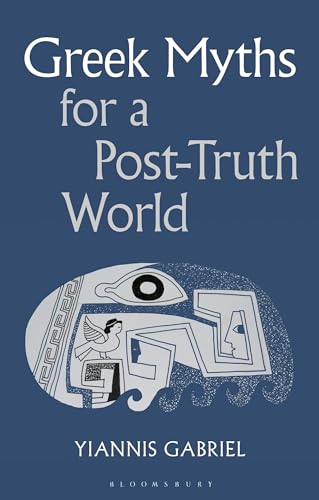
Greek Myths for a Post-Truth World
Yiannis Gabriel
Questions & Answers
Greek myths address contemporary issues like environmental degradation, mass migration, and inequality by reflecting timeless human concerns and providing narratives that resonate with modern anxieties. For instance, the myth of Phaëthon symbolizes environmental degradation, as his misuse of power leads to planetary devastation. This resonates with today's climate change concerns. The story of Iphigenia in Tauris addresses mass migration and cultural identity, as she and Orestes experience exile and longing for home. The myth of Oedipus deals with inequality and the consequences of hubris, as Oedipus's tragic fall highlights the dangers of power and the need for justice. These myths offer insights into our current challenges, encouraging reflection and action.
In a post-truth society, myths play a crucial role in shaping our understanding of truth and untruth. They serve as narratives that reflect and interpret complex truths, often through allegory and symbolism, allowing us to grapple with abstract concepts like truth, authority, and reality. Myths can reveal the fragility of truth, the allure of authoritarianism, and the dangers of misinformation by depicting characters like Erysichthon, who succumbs to his desires and brings about his own downfall. They also offer alternative perspectives, encouraging critical thinking and challenging dominant narratives. By examining myths, we can better understand the nuances of truth and untruth, fostering a more informed and discerning society.
Greek myths reflect our anxieties and fears about identity, technology, and the future by addressing universal human concerns through mythological narratives. For identity, myths like Oedipus and Narcissus explore issues of self-discovery, parent-child relationships, and the search for identity, resonating with contemporary struggles over personal and collective identities.
Regarding technology, myths like Phaëthon's story caution against the dangers of hubris and the misuse of technology, highlighting the risks of overreliance on technology and the potential for unforeseen consequences.
Finally, myths like the Trojan War and the adventures of Odysseus address our fears about the future, including the unknown, the dangers of war, and the challenges of navigating a changing world. These myths serve as cautionary tales and sources of wisdom, helping us navigate our own uncertainties and fears.
Greek myths offer valuable lessons about leadership, hubris, and the dangers of authoritarianism. The story of Agamemnon illustrates the perils of hubris, as his excessive pride and desire for glory led to his downfall. This teaches us that leaders must be wary of overconfidence and the dangers of believing they are invincible.
The myth of Narcissus highlights the dangers of narcissism, showing how a culture of self-admiration can lead to isolation and tragedy. This serves as a caution against leaders who prioritize their own image over the well-being of their people.
The Trojan War and the Argonautic Expedition demonstrate the importance of building strong coalitions, attracting diverse talents, and adapting strategies to changing circumstances. They also illustrate the dangers of internal conflicts and overreliance on a single individual or resource.
The myth of Oedipus teaches us about the consequences of ignoring one's destiny and the importance of self-awareness. It also serves as a warning against the dangers of authoritarianism, as Oedipus' rule was characterized by tyranny and oppression.
Lastly, the story of the frogs wanting a strongman leader shows how a populace can be seduced by charismatic leaders who promise order and stability, even if it means sacrificing democracy and personal freedoms. This underscores the importance of maintaining a healthy skepticism towards charismatic leaders and the dangers of blind loyalty.
Myths can serve as powerful tools for navigating modern complexities. They offer narratives that reflect our deepest desires and fears, allowing us to understand and confront contemporary issues like environmental degradation, inequality, and technological advancements. By examining myths, we can gain insights into human nature, societal dynamics, and the nature of truth. They inspire us to imagine alternative ways of living and experiencing the world, fostering empathy and understanding. Myths also provide a framework for interpreting our experiences and emotions, helping us manage anxieties and make sense of our lives. Furthermore, they can serve as cautionary tales, warning against harmful ideologies and actions. By integrating mythological thinking with reason and practical wisdom, we can work towards a more equitable and sustainable future.